The actor that played the Telletubby, Tinky Winky, died alone on a street in Liverpool from alcoholism at the age of 52.
The post The actor that played the Telletubby… appeared first on Crazy Facts.
fact
The actor that played the Telletubby, Tinky Winky, died alone on a street in Liverpool from alcoholism at the age of 52.
The post The actor that played the Telletubby… appeared first on Crazy Facts.
Every so often, someone comes to AskReddit with a totally absurd hypothetical question. In this case, the question was about how one would manage to drink a 12-pack of beer every single day for a month while still holding down a job. The prize?
A million dollars.
As many Redditors pointed out, drinking a 12-pack every day is just standard for many alcoholics. But for the rest of us? People came up with some truly creative solutions to this truly random problem.
“Use four weeks of vacation and head to Mexico. Drink no other beer but Tecate Light. Come back home. Collect $1 million.”
“Save up a month’s worth of leave. Make the month February. Stay at home and just enjoy media.”
“My father was a psychiatrist and worked on drug and alcohol wards.
The typical American beer has a alcohol level that is designed to give a buzz but not get you drunk. A twelve pack fits perfectly in this business model.
He treated many functioning alcoholics who drank a case of beer a day.
A twelve pack was the most common amount drunk.”
“Drink after work. I’m a reasonably-sized guy with a passable tolerance, I’ll just start as soon as my day ends. Mornings gonna suuuuck but I can live with it for a month for a flat mil.”
“Definitely need to split it up and hide some of the drinking. Down a couple when you get up (before you brush your teeth of course). Sneak one over lunch, maybe another around 3 as well. 8 is much more manageable in terms of not ending up rough the next morning.”
“1.wake up one beer get ready for the day
2. 2 beers at lunch time (food slows the absorption of alcohol into the liver)
3. Get home and start cranking as many as you can before dinner at 6 or 7.
4. Hopefully only have 3 left for after dinner which means you’ll be done before 9 with ample time to do prepare yourself so you are not hungover the next day”
“I came up with the same, although I set an alarm for 3 am and pound two then back to bed.”
“Make it non alcoholic beer et voila.”
“Open 9 beer and let them flatten in the fridge during work (To prevent being all bloated and gassy). Moment I get off start drinking. Eat dinner while drinking. Follow every 3 beer with water, walk to the grocery store, drunk groceries should naturally grab me alot of carbs which will be good. Also help me walk off alot of calories. Chug a quarter gallon of water before bed (Pee breaks constantly). Go to bed early! alarm set early, sugar and Tylenol ready to go in the morning try to work out before work to burn more calories, lots of veg and lean protein for lunch.”
“”Hey boss, if I can slam a case of beers every day for a month and don’t get fired I get a hundred grand!” Offer a 50/50 split and boom $950,000 in the pocket.”
“Work in retail. Nobody cares.”
“Worked in retail, sent people home for showing up drunk. Didn’t fire them, was more expensive to train someone new who’d also have their own issues that to just send this guy home a couple times a month.”
“Start drinking as soon as I get home from work until I go to sleep. Rinse repeat. So no changes really.”
“I drank a 12 pack a day for almost 2 years, the key is to have a drinking problem.”
The post People Brainstorm How They’d Drink a 12-Pack Everyday for a $1 Million Prize appeared first on UberFacts.
Alcohol abuse is a problem that untold amounts of people deal with on a daily basis. But there may be a surprising new tool on its way to help treat this addictive disorder: a hallucinogenic drug.
According to a report in Nature Communications, researchers suggest a single dose of ketamine can help weaken the desire to drink beer. While the drug’s effect was modest, there is still plenty of room for optimism, according to addiction researcher David Epstein.
“If a seemingly small one-time experience in a lab produces any effects that are detectable later in real life, the data are probably pointing toward something important,” explained Epstein, who works for the National Institute on Drug Abuse in Baltimore.
I read an article online about the use of ketamine to treat alcoholism. There are so many alternative forms of medicine that we haven't explored nearly enough.
— Trey Roberts (@Clydesthename) December 15, 2019
Addiction is considered a memory disorder, so finding a way to stop the memories that trigger cravings for beer was a key component of the ketamine study.
“We’re trying to break down those memories to stop that process from happening, and to stop people from relapsing,” said Ravi Das, a co-author of the study and a psychopharmacologist at University College London.
To conduct the study, Das and the research group recruited 90 people who admitted to drinking too much beer. Participants were exposed to pictures of beer, drank one in the lab and rated their cravings, enjoyment of drinking and their desire to drink another one.
The participants returned a few days later and were divided into three groups for further examination. The researchers utilized different methods to test the effect of ketamine and the different triggers and memories associated with drinking beer. Interestingly, the results showed that the people who had their beer memories jogged before receiving ketamine reported both a lower desire and less enjoyment for beer.
Nine months after the study concluded, all 90 participants had cut their beer consumption in half. Surprisingly, that even included those who did not receive a dose of ketamine. Epstein explained that the full-scale reduction could be due to the self-awareness that comes from enrolling in a study.
“Behavior can change for all sorts of reasons that aren’t specific to the experimental treatment,” he said.
Ketamine has been show to be a viable treatment for a number of conditions, including treatment-resistant depression. It triggers the regeneration of brain cells. Has been shown to reduce suicidal thoughts and treat alcohol addiction as well. Needs more research.
— Andrew Abbass (@ParadigmSlip) February 22, 2018
While the research on ketamine’s short-term effects on drinking is far from over, the early results are promising. The research group plans on conducting clinical trials on people with drinking problems. In addition, they also want to test other problematic memories, such as post-traumatic stress disorder.
Of course, with any drug, there are concerns about abusing ketamine. But the upside of its ability to weaken the lure for alcohol makes it a worthwhile option to explore.
The post A Hallucinogenic Party Drug Seems to Help Curb Alcohol Addiction. Who Knew? appeared first on UberFacts.
Alcohol is so common these days. It helps us connect, it greases wheels, it’s fun, it involves us in a community event, et al – and if you’re a mom, that goes double, because everyone knows that wine = mommy juice.
A reality that mom Celeste Yvonne was forced to confront head-on when she decided to quit drinking altogether.
It turns out that people think they have the right to ask you, in public and without warning, why you’re not drinking – which is bound to (and did) lead to at least one awkward conversation.
She decided it’s time to change the narrative surrounding not drinking, and her Facebook post has since gone viral.
I went to a play date the other day at someone's house. Almost the moment I stepped through the front door, the mom…
Posted by Celeste Yvonne – The Ultimate Mom Challenge on Wednesday, May 15, 2019
Here’s the story:
I went to a play date the other day at someone’s house. Almost the moment I stepped through the front door, the mom giggled “Mimosa time!” and my body froze up.
I wasn’t prepared for this.
Most times, when I’m heading to a social gathering, I have time to prepare. I mentally prepare, I physically prepare (I always bring a kombucha with me), I emotionally prepare.
I think about what I will say when someone asks why I’m not drinking. I think about how deep I want to get in the conversation — because some days I’m ready to go there, and other days I want to talk about anything BUT that.
Today, because I was so caught off guard, I probably looked like a deer in headlights. I almost said “Yes” and thought about just pretending to sip it. But I said “Not right now, I’m good thank you” and the conversation veered to something else.
But it came up again about 15 minutes later. And again another 15 minutes later. And I was practically banging my head against the wall mentally thinking “why don’t I just tell her I don’t drink?”
But I didn’t. I was afraid she would think I wasn’t fun. I was afraid she wouldn’t want to have more play dates with me.
I read a meme yesterday that said “I determine my kids play dates by which mom I want to drink wine with”.
Being alcohol free can truly feel ostracizing. And it’s strange to think that alcohol is the only drug that we have to explain NOT using.
Time to change the narrative. Alcohol free is a choice that should not require an explanation, embarrassment or fear of condemnation. #changethenarrative
People have been supportive, for the most part, and agree that not drinking is a personal choice that shouldn’t be on display unless we choose to share our reasons.
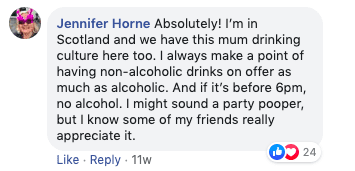

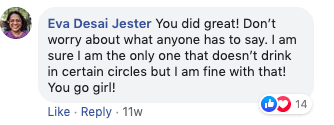
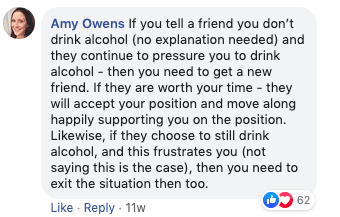
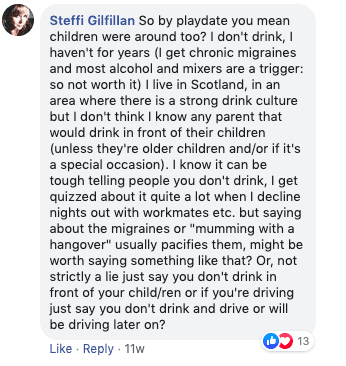
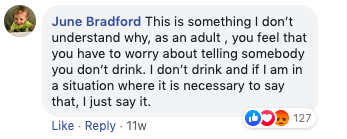
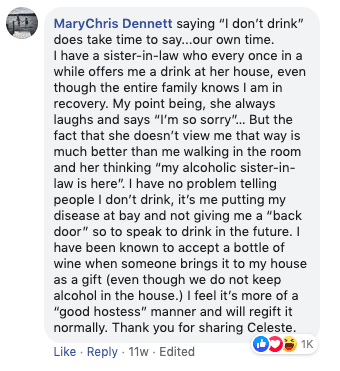
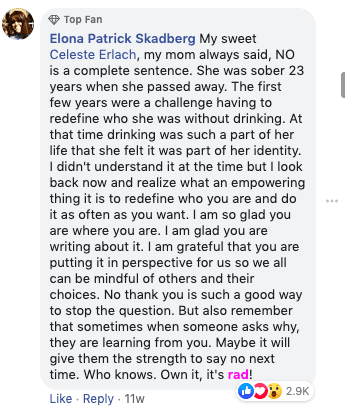
Image Credit: Facebook
So get out there, people, and start doing what your mama taught you to do in kindergarten…
Mind your own business!
The post A Mom Shared Her Thoughts About Quitting Drinking After a Weird Encounter with Another Mom appeared first on UberFacts.
While Alcoholics Anonymous claims the program, based on self-reported data, worked for 75 percent of people, a psychiatry professor from Harvard Medical School found the success rate to be actually only 5 to 8 percent.
There’s a special minimally-fermented wine used at masses where the priest is a current or recovering alcoholic. 00
An Irish woman was denied for a teaching job in South Korea, citing the “alcoholism nature” of Irish people as reason for rejection. 10
Jerningham Wakefield, a New Zealand politician was such a notorious drunk, his friends would lock him in Parliament overnight to keep him sober enough to vote the next day. However, this failed in 1872 when his political enemies began lowering bottles of whiskey down the chimney.
Kids who try to act cool in their early teens are more likely to have alcohol and relationship problems later in life.
 A Canadian Non-Profit organization began teaching Vancouver-area alcoholics how to brew their own beer and make wine in an effort to keep them from drinking alternate sources of alcohol, like rubbing alcohol, mouthwash, and hand sanitizer.
A Canadian Non-Profit organization began teaching Vancouver-area alcoholics how to brew their own beer and make wine in an effort to keep them from drinking alternate sources of alcohol, like rubbing alcohol, mouthwash, and hand sanitizer.